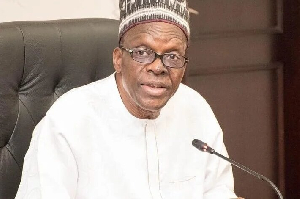Accra (Greater Accra) 9th July '99 - The Institute of Statistical, Social and Economic Research (ISSER) of the University of Ghana, Legon, on Thursday said with a GDP growth rate of 4.6 per cent, it was "heart warming" to find end-of-year inflation at 15.7 per cent, from 70.8 at the end of 1995 and 20.8 at the beginning of 1998.
Inflation, according to the Ghana Statistical Service, was 9.4 per cent at May, this year. The institute was launching the 1998 State of the Ghanaian Economy Report in Accra. ISSER is an independent statistical research institution with the mission of carrying out activities that promote socio-economic development in the country.
Professor Kwadwo Asenso-Okyere, Director of ISSER, commended the government for the tremendous improvement in the country's economic management as evidenced in the various macro-economic indicators.
He, however, noted that the economy could have done better if it were not for some external shocks experienced last year.
Prof. Asenso-Okyere commended the reduction in inflation which, he said, had been spurred on by the moderate growth in money supply of 17.3 per cent as against 39.5 per cent in 1997. He said the Cedi was stable in 1998 with a relative depreciation of just 4.2 per cent in the interbank market and 3.9 per cent at the forex market, using end-period rates.
The ISSER Report said interest rates have been sticky over the years even though inflation has fallen consistently.
"For instance, the rediscount rate remained at 45 per cent from December 19995 to August 1998 before coming down to 37 in November."
Looking at the fiscal performance of the economy last year, Prof Asenso-Okyere said, using the broad format, the overall budget deficit was about 6.3 per cent of GDP as compared with a projection of 7.9 per cent of GDP and 8.6 per cent of GDP in 1997.
He said the low budget deficit resulted from better expenditure monitoring and control in 1998 than in previous years.
He said the report noted that as compared to the 1997 figures, revenue rose by 29.9 per cent without divestiture receipts and 35.7 per cent with divestiture receipts. Total revenue as a proportion of GDP increased from 18.4 per cent in 1997 to 19.9 per cent the following year.
Prof. Asenso-Okyere said government expenditure on salaries and wages continue to decline as a proportion of recurrent expenditure, adding that from 90 per cent in the 1980's, the proportion had gone down to 33.5 per cent in 1998.
He said food production was the highest, 5.3 per cent, since the economic reforms began in 1983. Professor Asenso-Okyere said he was happy about the performance of industry, service and manufacturing sectors and emphasised that more efforts be put in to make the situation get better. Giving the outlook for 1999, Professor Asenso-Okyere said care must be taken not to run the country into a recession adding that other indicators like unemployment must be watched closely. He said with low food prices, prospects for a single digit inflation during the year are bright.
"One area that needs more attention is government expenditure...in relation to current revenue levels, government expenditure has not fallen as mush as it should and further restraints are necessary to reduce the budget deficit as a proportion of the GDP to help keep inflation down. "This is especially so, as we approach an election year, in order for us not to be ushered into another post-election inflation spiral".
Mr Alex Ashiagbor, a member of ISSER, said he appreciated the optimistic tone of the report, which was a reflection of good policies that were being undertaken by the government. He called on parliamentarians and other stakeholders to take more interest in the operations of ISSER to enable it to make more informed decisions on the economy.
Click to view details



Business News of Friday, 9 July 1999
Source: null
















